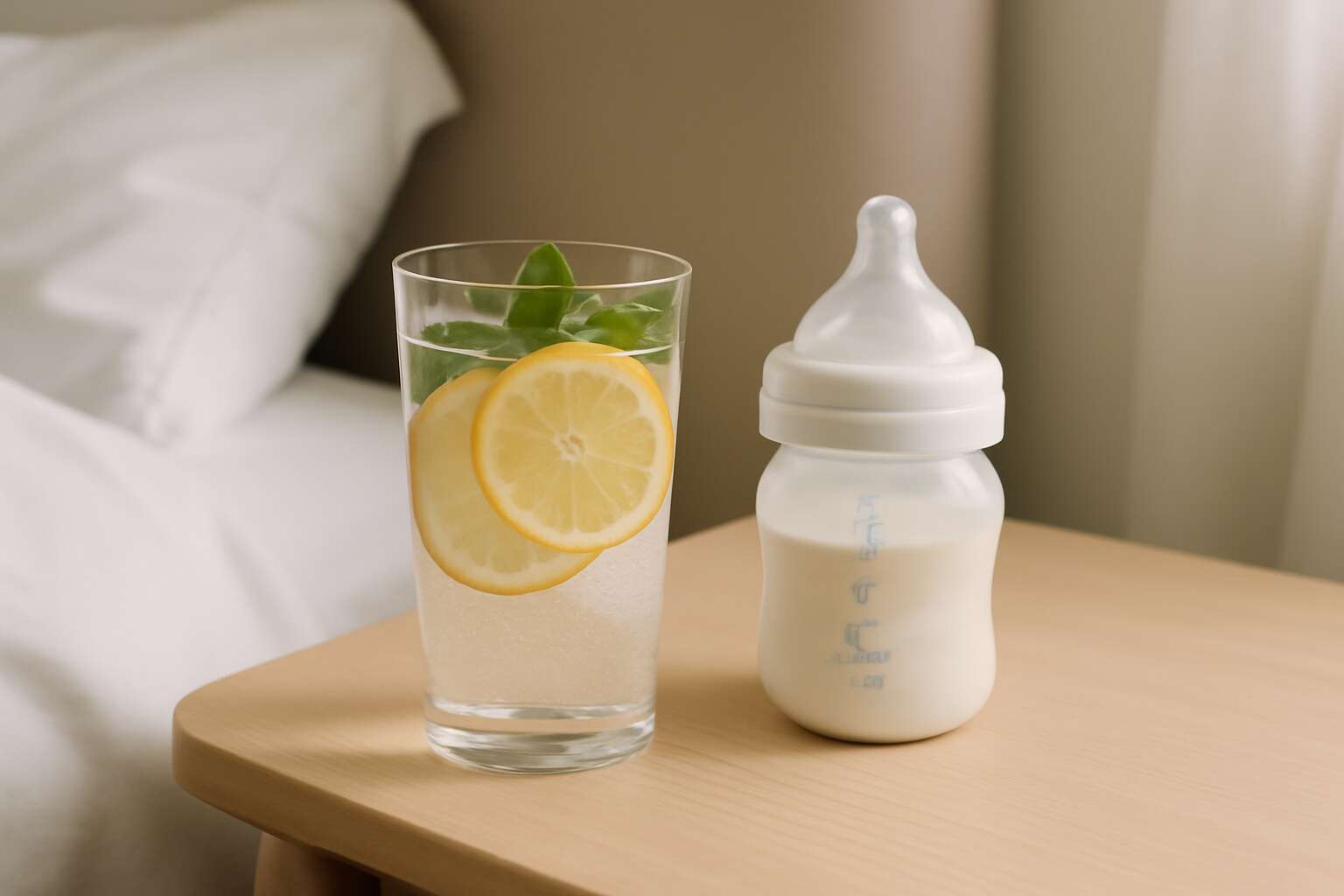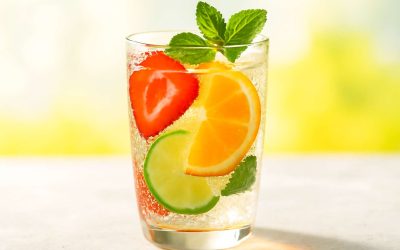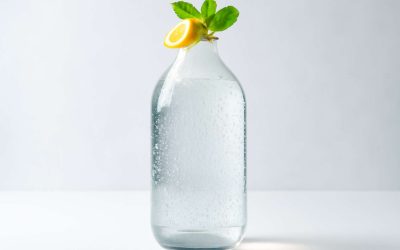Understanding Sparkling Water and Its Variants
What Is Sparkling Water?
Few beverages evoke a sense of effervescent sophistication quite like sparkling water. Its lively bubbles and crisp taste make it an appealing alternative to sugary sodas, especially when navigating the delicate terrain of breastfeeding. Understanding sparkling water and its variants is essential for nursing mothers who seek hydration without compromising their health or that of their little one.
So, what exactly is sparkling water? Essentially, it’s water infused with carbon dioxide gas under pressure, creating those signature bubbles that dance on your palate. Variants of sparkling water include natural mineral waters, which are sourced from mineral-rich springs, and artificially carbonated options, often with added flavors or minerals. Some prefer the unadulterated simplicity of plain sparkling water, while others enjoy flavored options that contain natural essences or fruit extracts. For those curious about the health implications, it’s worth noting that most varieties are free from calories, sugar, and artificial sweeteners, making them a popular choice for breastfeeding women.
- Natural sparkling water from mineral springs
- Flavored sparkling water with natural extracts
- Artificially carbonated varieties with added minerals
In South Africa, the burgeoning market offers a delightful array of options, allowing breastfeeding mothers to indulge without guilt. After all, hydration is the cornerstone of good health, and sparkling water during breastfeeding can be both a refreshing and safe choice—so long as one remains attentive to individual sensitivities and preferences.
Different Types of Sparkling Water
Understanding sparkling water and its diverse variants is a journey into a realm where effervescence meets purity. Each sip dances with life, a symphony of bubbles that invigorate the senses and offer a crisp alternative to the sugary temptations of modern beverages. For breastfeeding mothers, this sparkling allure holds promise, but knowing the subtle distinctions can make all the difference.
Natural sparkling water from mineral springs boasts a rich tapestry of trace elements, sourced from the depths of the earth, providing not only hydration but a touch of mineral magic. Flavored sparkling water, with its natural extracts, offers a gentle infusion of fruit and botanicals, elevating hydration without the addition of artificial sweeteners. Meanwhile, artificially carbonated variants often contain added minerals to enhance taste, yet remain free from calories and sugar—key considerations for those nurturing new life.
In South Africa’s vibrant market, these different types of sparkling water have woven themselves into daily routines, providing a refreshing sanctuary for breastfeeding women. Whether plain or infused, the shimmering bubbles serve as a testament to hydration’s artistry—an elegant, safe choice during this delicate chapter of motherhood.
Flavored vs. Plain Sparkling Water
Understanding the nuances between flavored and plain sparkling water can turn a simple sip into a moment of hydration bliss—especially for breastfeeding moms navigating their beverage choices. While plain sparkling water offers a crisp, bubbly refreshment free from added sugars or artificial ingredients, flavored variants introduce a delightful twist with natural extracts like lemon, berry, or mint. These infusions can make hydration feel less like a chore and more like a treat, without compromising safety during breastfeeding.
For those curious about which type of sparkling water during breastfeeding is best, consider this: natural flavored sparkling water often contains fewer additives and is a gentle way to diversify your fluid intake. In South Africa, where the market is brimming with options, choosing the right sparkling water can be a game-changer. To help you decide, here’s a quick comparison:
- Plain sparkling water: Pure, simple, and free from any additives.
- Flavored sparkling water: Infused with natural fruit extracts, offering a subtle taste enhancement.
Both options are generally safe during breastfeeding, but being mindful of added ingredients ensures you maintain optimal hydration without unwanted surprises. After all, whether you prefer the unadulterated sparkle or a hint of fruity flair, the key is to enjoy your sparkling water during breastfeeding responsibly—and with a smile!
Nutritional Profile of Sparkling Water During Breastfeeding
Calories and Sugar Content
In the shadowed corridors of nourishment, sparkling water during breastfeeding emerges as a shimmering refuge—an unassuming elixir that whispers promises of hydration without the burdens of excess. Its nutritional profile is remarkably modest, a ghostly silhouette in the realm of liquids. Typically devoid of calories and sugar, it offers a pure, effervescent delight that can quench even the most ravenous thirsts without tipping the delicate scales of health.
Many wonder if carbonated beverages disrupt the sacred act of nourishing a new life. Rest assured, the calorie count in most sparkling water during breastfeeding remains negligible—often close to zero—making it an alluring alternative to sugary sodas or artificially flavored drinks. Its lack of sugar ensures that the sweetness of life isn’t compromised, nor does it threaten the fragile balance of a mother’s diet. For those seeking clarity, here’s a brief overview:
- Calories: Nearly zero in unflavored varieties
- Sugar Content: Virtually nonexistent, unless flavored with added sweeteners
Thus, sparkling water during breastfeeding becomes a mysterious yet benign companion—an effervescent whisper of hydration that sustains without excess, a ghostly balm for the parched soul wandering through the labyrinth of motherhood’s shadows.
Additives and Artificial Flavorings
The nutritional profile of sparkling water during breastfeeding is remarkably straightforward, yet it warrants careful consideration—especially when it comes to additives and artificial flavorings. Pure sparkling water is essentially free of calories and sugar, making it a safe hydration choice for nursing mothers. However, many flavored varieties contain additives that can subtly influence the overall health benefits.
Most flavored sparkling water during breastfeeding includes artificial flavorings designed to mimic natural tastes. These additives are generally considered safe, but some women prefer to avoid them to minimize intake of synthetic chemicals. Additionally, certain flavorings may contain preservatives or sweeteners, even if the beverage remains low in calories. It’s wise to scrutinize labels for ingredients like artificial sweeteners or stabilizers that might not align with a holistic breastfeeding diet.
To better understand the landscape, here’s a quick overview of common additives in flavored sparkling water:
- Artificial sweeteners such as aspartame or sucralose
- Preservatives to extend shelf life
- Natural and artificial flavorings, sometimes indistinguishable from each other
While these elements are generally regarded as safe, individual sensitivities vary—especially during breastfeeding. Choosing sparkling water during breastfeeding with minimal or no additives can offer peace of mind, ensuring that hydration remains both refreshing and wholesome during this delicate phase of nurturing a new life.
Mineral Content and Hydration Benefits
Beyond its effervescent charm, sparkling water during breastfeeding offers a surprisingly rich mineral profile that can contribute to overall hydration and wellness. While it’s primarily celebrated for its refreshing bubbles, many varieties also contain vital minerals like calcium, magnesium, and potassium—elements that support both mother and baby. These minerals help maintain electrolyte balance, which is essential during the demanding months of breastfeeding, ensuring that hydration isn’t just quenching but nourishing.
In South Africa, where hydration needs are often amplified by warm climates, sparkling water during breastfeeding can be a delightful way to replenish lost minerals and stay energized. Its natural fizz can make drinking water more appealing, encouraging consistent hydration—an often overlooked pillar of postpartum health. The effervescent nature stimulates the palate, making it easier to meet daily fluid requirements without the monotony of plain water.
- Effervescent hydration enhances fluid intake.
- Minerals like calcium and magnesium support maternal health.
- The sparkling quality offers a refreshing alternative to sugary drinks.
In essence, sparkling water during breastfeeding isn’t just a fizzy indulgence; it can be a vital part of maintaining a balanced, wholesome diet during this delicate chapter of life. The combination of hydration and mineral content creates a symphony of benefits, subtly nourishing as it refreshes—an ode to life’s resilience and beauty.
Health Benefits of Drinking Sparkling Water While Breastfeeding
Hydration and Comfort
Hydration is the cornerstone of nourishing both mother and child, especially during breastfeeding. Sparkling water during breastfeeding offers a refreshing alternative to still water, with the added benefit of stimulating your senses and encouraging increased fluid intake. Its effervescent nature can make hydration feel less like a chore and more like a treat—an unexpected boon for tired moms navigating sleepless nights.
Beyond its invigorating fizz, sparkling water can help soothe minor digestive discomforts, providing a gentle comfort that plain water sometimes lacks. For breastfeeding mothers, maintaining optimal hydration levels is crucial, as it directly influences milk production and overall well-being. The bubbly texture can make drinking more enjoyable, ensuring you stay well-hydrated during those long, demanding days.
- Enhanced hydration without added sugars
- Potential to reduce feelings of nausea
- Comforting, crisp alternative to still water
In a landscape where every sip counts, sparkling water during breastfeeding emerges as a surprisingly beneficial hydration partner—delivering both the essential moisture your body craves and a touch of sensory delight that keeps dehydration at bay.
Digestive Benefits
Amidst the whirlwind of sleepless nights and relentless demands of new motherhood, hydration becomes not just a necessity but a vital act of resilience. Sparkling water during breastfeeding offers more than just hydration; it provides a sensory reprieve that can subtly ease minor digestive discomforts often experienced during this delicate phase. The effervescent nature of sparkling water stimulates the palate, making fluid intake less monotonous and more engaging—transforming a simple sip into a moment of refreshment.
Beyond its invigorating fizz, sparkling water can serve as a gentle remedy for feelings of nausea and bloating, common companions on the journey of breastfeeding. Its carbonation can help soothe the digestive tract, promoting a more comfortable experience for mothers navigating the complexities of postnatal recovery. Incorporating sparkling water into daily routines may not only elevate hydration but also bolster overall well-being, supporting the body’s need for replenishment during these demanding times.
- Increased comfort from digestive relief
- Enhanced hydration through sensory engagement
- Potential reduction in nausea symptoms
Satisfaction and Flavor Variety Without Calories
Choosing sparkling water during breastfeeding isn’t merely about quenching thirst; it’s a conscious act of nurturing oneself amidst the chaos of new motherhood. The health benefits extend beyond hydration, offering a sensory experience that invigorates and sustains. Unlike still water, sparkling water’s effervescence awakens the palate, transforming hydration into a moment of mindful pleasure. This subtle stimulation can help mothers stay committed to their fluid intake, ensuring vital nutrients reach both mother and baby.
Moreover, the satisfaction derived from the fizzy sensation can diminish the craving for less healthy alternatives, providing a guilt-free indulgence. With no calories and minimal additives, sparkling water during breastfeeding becomes a versatile companion—offering flavor variety without compromising health. Whether plain or infused with natural fruit essences, it’s an elegant way to elevate everyday hydration, embracing the profound connection between well-being and the simple act of drinking.
Potential Concerns and Risks
Effects of Carbonation on Digestion
While sparkling water during breastfeeding might seem like a bubbly escape from the ordinary, it’s important to understand the potential concerns that come with its effervescent charm. The carbonation in sparkling water can sometimes cause bloating or gas, which might lead to discomfort for both mother and baby. For some, the fizzy nature can irritate the stomach, leading to indigestion or reflux, especially if consumed in excess. This may seem trivial, but it’s a reminder that not all beverages affect digestion equally.
Additionally, the effects of carbonation on digestion are worth considering. The bubbles, while delightful, can increase stomach pressure and lead to a feeling of fullness or mild nausea. For breastfeeding mothers, maintaining comfort is key, and excessive intake of sparkling water during breastfeeding could exacerbate feelings of bloating. If you notice any discomfort or changes in your digestion, it might be wise to monitor your intake and opt for still water when necessary. Remember, moderation is the secret ingredient in enjoying sparkling water during breastfeeding without unintended consequences.
Possible Tooth Enamel Erosion
Amid the effervescent allure of sparkling water during breastfeeding lies a subtle caution—one that whispers beneath the bubbling surface. While the fizzy drink may seem like a refreshing escape, it holds potential risks that shouldn’t be overlooked. The acidity and carbonation can, over time, pose a threat to tooth enamel, especially for mothers who indulge frequently. The delicate enamel, once eroded, leaves teeth vulnerable to decay, sensitivity, and discoloration—turning a sparkling delight into a silent adversary.
For breastfeeding mothers, maintaining oral health is paramount, and excessive consumption of sparkling water during breastfeeding can accelerate enamel erosion. To safeguard your smile, it’s wise to enjoy sparkling water in moderation. Remember, a gentle rinse with plain water afterward can help neutralize acidity. Sometimes, choosing still water may be a safer choice, ensuring hydration without risking the sparkle’s hidden toll on your teeth.
Artificial Additives and Allergies
Potential concerns surrounding sparkling water during breastfeeding extend beyond just the acidity and carbonation. One often overlooked aspect is the presence of artificial additives and flavorings, which can sometimes cause allergic reactions in sensitive individuals. These additives are frequently used to enhance flavor, but for breastfeeding mothers, they may pose unforeseen risks to both mother and baby.
Some flavored sparkling water varieties contain artificial sweeteners or preservatives that could potentially trigger allergies or digestive discomfort. While most are safe in moderation, it’s wise to scrutinize labels carefully. An allergic reaction might manifest as skin irritation, bloating, or even more severe symptoms, emphasizing the need for cautious consumption during breastfeeding.
To navigate these concerns, consider opting for natural, additive-free sparkling water options or simply stick to plain still water. After all, safeguarding your health and that of your little one often means choosing simplicity—sometimes, plain water is the safest bet during breastfeeding.
Bloating and Gas
Amid the effervescent dance of bubbles, sparkling water during breastfeeding may seem innocuous, yet beneath its shimmering surface lie potential risks that deserve careful attention. Bloating and gas, often dismissed as minor inconveniences, can become unwelcome companions when carbonation interacts with the delicate digestive system. For new mothers navigating the labyrinth of postpartum recovery, these symptoms can turn simple hydration into a source of discomfort and distress.
The carbonation process introduces carbon dioxide into the liquid, which can lead to an accumulation of gas in the gastrointestinal tract. This buildup may cause bloating, abdominal distension, and even colicky sensations—unwelcome sensations that can interfere with maternal comfort and milk production. Some women find that their bodies react more sensitively to the fizzy nature of sparkling water during breastfeeding, amplifying these issues.
While moderate consumption might be harmless for many, it is wise to listen to one’s body. For some, the persistent presence of gas can lead to feelings of fullness and unease, disrupting the vital rhythm of breastfeeding. Consider this natural order: a gentle, still water might serve as a safer, more soothing alternative, ensuring hydration without the tumult of excess gas. After all, during this tender chapter of motherhood, simplicity often offers the greatest solace.
Consulting Healthcare Professionals About Sparkling Water During Breastfeeding
When to Seek Medical Advice
Amid the swirling currents of new motherhood, the question of what sustains us often drifts like a gentle breeze—particularly when it comes to sparkling water during breastfeeding. While many find solace in its effervescent charm, the delicate balance of health and hydration warrants cautious navigation. Consulting healthcare professionals is essential when considering the inclusion of sparkling water during breastfeeding, especially if you notice any unusual symptoms or discomfort.
If any of these signs appear, it’s time to seek medical advice without delay:
- Persistent bloating or abdominal pain that disrupts daily life.
- Unexplained allergic reactions after consuming sparkling water.
- Changes in your baby’s behavior or feeding patterns that coincide with your beverage choices.
Listening to your body and maintaining open dialogue with healthcare providers ensures that your journey with sparkling water during breastfeeding remains both safe and nourishing. When in doubt, a professional’s insight can illuminate the path through the effervescent haze—guiding you with wisdom and care during this sacred chapter.
How to Discuss Dietary Choices with Your Doctor
Engaging in a dialogue with healthcare professionals about sparkling water during breastfeeding is an essential act of nourishment not only for your body but for the delicate balance of trust and safety that underpins motherhood. It’s easy to assume that hydration choices are trivial, yet the nuanced effects of sparkling water—particularly its carbonation and additives—can ripple through your wellbeing and your baby’s health in subtle but significant ways.
When discussing your dietary choices, consider approaching your healthcare provider with clarity and openness. It’s beneficial to prepare questions such as:
- Are there any specific concerns about carbonation affecting my digestion or my baby’s feeding patterns?
- Could certain flavored or mineral-enhanced sparkling waters pose allergenic risks?
- How might the ingredients in sparkling water influence my hydration or comfort during breastfeeding?
By fostering an honest and detailed conversation, you not only safeguard your health but also cultivate a deeper understanding of how your beverage choices, like sparkling water during breastfeeding, fit into your overall wellbeing. Remember, your healthcare professional’s insights are invaluable, especially when navigating the effervescent haze of new motherhood’s many questions. Their guidance can illuminate the path, ensuring your hydration journey remains both nourishing and safe for your little one.
Tips for Safely Enjoying Sparkling Water While Breastfeeding
Choosing Unsweetened and Natural Options
When it comes to sparkling water during breastfeeding, choosing the right sips can feel like navigating a bubbly minefield. The key is to stick with unsweetened and natural options — because your baby’s health (and your taste buds) deserve the best. The good news? Most plain sparkling water is free from added sugars and artificial flavorings, making it a safe and refreshing choice for new moms who crave a fizzy lift without the calorie crash.
To maximize safety and enjoyment, consider selecting sparkling water that is free from artificial additives, which can sometimes cause bloating or allergic reactions. If you’re worried about carbonation-related discomfort, try gradually increasing your intake to see how your digestive system responds. Remember, moderation is your best friend here—after all, too much fizz might turn into an uncomfortable gas party for both you and your little one.
- Opt for plain, unsweetened sparkling water to avoid unnecessary additives.
- Limit your intake to observe how your body and digestive system react.
- Stay hydrated—because even the most sparkling of waters won’t do much good if you forget to drink enough during breastfeeding.
Monitoring Your Body’s Response
Monitoring your body’s response to sparkling water during breastfeeding is essential for maintaining both your comfort and your baby’s health. While many new moms enjoy the bubbly sensation, it’s crucial to pay close attention to how your digestive system reacts. Some women find that carbonation can lead to bloating or gas, which might affect both during those precious breastfeeding moments.
Start with small sips, gradually increasing your intake to gauge tolerance. If you notice discomfort, it’s wise to cut back and see if symptoms improve. Keeping a mental note or even journaling your reactions can help identify any patterns. Remember, every body reacts differently — what’s perfectly fine for one may not be for another.
Incorporate a simple
- listen to your body
- stay hydrated
- limit intake if symptoms arise
approach to enjoy sparkling water during breastfeeding without risking unnecessary discomfort. Your well-being and that of your little one depend on mindful choices and attentive observation.
Maintaining Dental Health
In the delicate dance of nurturing both mother and child, choosing what to sip becomes a mindful ritual. Sparkling water during breastfeeding can be a refreshing companion, yet safeguarding your dental health is paramount in this effervescent journey. The carbonation, while delightful to the palate, poses a subtle threat to enamel integrity—an invisible foe that erodes the gleam of your smile over time.
To enjoy the bubbly bliss without compromising your dental fortress, embrace these gentle strategies. Rinse your mouth with plain water after each sip of sparkling water during breastfeeding, washing away residual acids that seek to weaken enamel. Avoid swirling the beverage around your teeth excessively or holding it in your mouth, as prolonged contact amplifies erosion risk. Consider drinking through a straw—this simple act directs the liquid past your teeth, reducing direct contact and safeguarding your smile.
- Opt for unsweetened, natural sparkling water options to minimize added acids and sugars.
- Limit exposure by consuming sparkling water during breastfeeding in moderation, paying close attention to how your teeth respond.
- Maintain a consistent oral hygiene routine—brushing twice daily with fluoride toothpaste and flossing—fortifying your defenses against erosion and decay.
In this symphony of hydration and health, awareness becomes your melody. With each mindful sip, you nurture not only your well-being but also that radiant smile that lights your motherhood journey—bright and resilient, just like the bond you cherish with your little one.
Alternative Hydration Options for Breastfeeding Mothers
Still Water and Herbal Teas
For many breastfeeding mothers, staying well-hydrated is a daily challenge, especially when plain water starts to feel monotonous. Fortunately, alternative hydration options like still water and herbal teas can be just as effective in maintaining fluid intake while offering variety. These beverages are gentle on the stomach and free from artificial additives, making them a safe choice during breastfeeding.
Herbal teas, in particular, provide a soothing way to increase fluid consumption without worrying about caffeine or artificial ingredients. Popular choices include chamomile, ginger, and peppermint, which can also help with digestion and relaxation. Still water remains a classic, natural option that supports hydration without added sugars or flavors. Combining these with sparkling water during breastfeeding can keep hydration interesting and enjoyable, ensuring mothers stay refreshed throughout the day.
Infused Water for Flavor
In the shadowed corridors of motherhood, hydration becomes a delicate ballet—an elusive partner in the quest to nurture both mother and child. For those seeking a symphony of refreshment, infused water for flavor offers a mysterious allure, transforming the mundane into a ritual of renewal. Imagine adding slices of cucumber, citrus, or fresh herbs to your sparkling water during breastfeeding, turning each sip into a subtle potion of vitality.
This ritual not only awakens the senses but also provides a gentle boost to your daily fluid intake. The effervescent whisper of sparkling water during breastfeeding can invigorate your routine, making hydration feel less like a chore and more like an indulgence. As you navigate the labyrinth of motherhood, exploring these alternative hydration options becomes a secret weapon — blending health with a dash of enchantment.
Limitations and Balance in Fluids Intake
While the allure of sparkling water during breastfeeding offers a tantalizing escape from mundane hydration, it is vital to recognize the importance of balance and moderation. Hydration is the cornerstone of postpartum well-being, yet overindulgence in any fluid—sparkling water included—can lead to discomfort or unintended consequences. The key lies in understanding your body’s signals, respecting your unique needs, and embracing alternative hydration options for breastfeeding moms.
In the symphony of nourishing oneself, incorporating a variety of fluids ensures both hydration and health. For instance, herbal teas, infused waters, and plain water can harmonize with sparkling water during breastfeeding, creating a delicate equilibrium. A gentle reminder: consuming too much carbonated beverage might cause bloating or gas, which can be uncomfortable during this tender phase.
To maintain optimal fluid intake, some mothers find it helpful to follow a simple, balanced approach:
- Prioritize water as your primary source of hydration.
- Limit sparkling water during breastfeeding to avoid excessive carbonation effects.
- Complement with nourishing herbal teas or infused waters, rich in natural flavors and free from artificial additives.
Ultimately, listening to your body’s whispers and integrating a spectrum of hydration options empowers you to nurture both yourself and your precious little one—making every sip a mindful, nourishing act in the artful dance of motherhood.




0 Comments